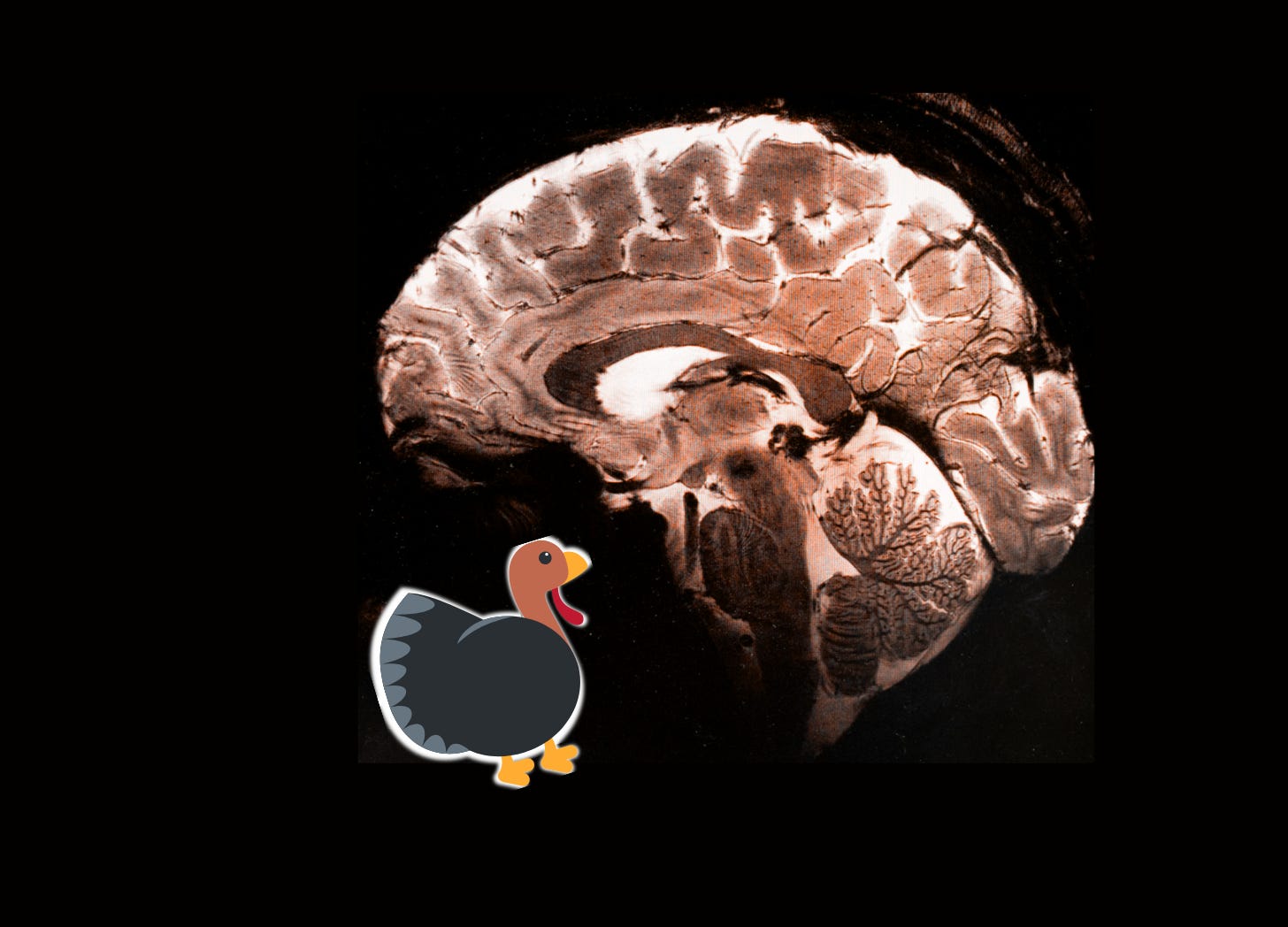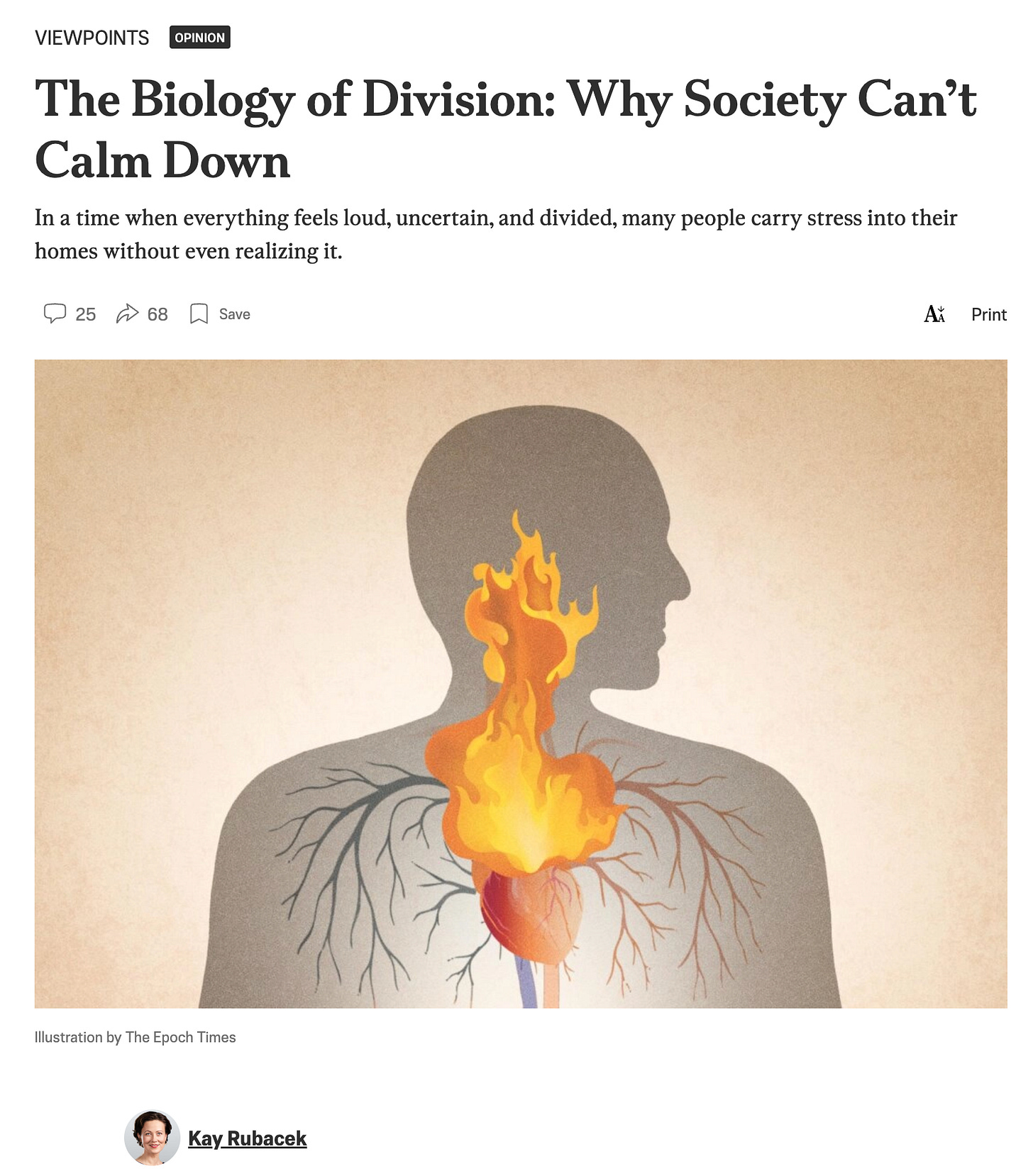Gratitude Isn’t a Feeling. It’s a High-Level Cognitive Skill.
And one country celebrates it nationally.
For most of human history, gratitude wasn’t a meal, a slogan, a “good vibe”, or a journal exercise. It wasn’t something you posted online to look balanced or spiritual.
Gratitude was a discipline, a virtue. It was something families, faith traditions, and entire communities practiced because it built trust, respect, humility, and character. People didn’t need brain scans to explain it. They simply knew life worked better when gratitude was part of it.
And then the modern world changed everything.
(Image: A scan of a human brain using the world’s most powerful MRI scanner by Alain Jocard. And a turkey, added by the author.)
When Gratitude Became a Science
In the late 1990s and early 2000s, psychologists began running the first controlled studies on gratitude. These early studies found improvements in mood, sleep quality, and overall life satisfaction. Later research linked gratitude to greater emotional resilience.
Then medical researchers joined in and saw benefits to improved heart-rate variability and lowered certain inflammation-related biomarkers and even influenced some immune-related gene-expression pathways.
The next major leap was when neuroscience stepped in.
In 2015, scientists using fMRI discovered that gratitude activates the brain regions responsible for clarity, emotional self-control, decision-making, and long-range thinking. These areas go quiet during stress and come back online only when the brain feels safe.
That’s when a truth became clear:
Gratitude is not just an emotion. It engages some of the brain’s most advanced cognitive networks.
And it’s precisely those networks that the modern world suppresses through constant stress, overload, and threat cues.
Many Fields Studied Gratitude, But No One Taught It
As the research grew, gratitude began showing up everywhere:
psychology
neuroscience
medicine
behavioral economics
education research
organizational leadership
military resilience
social neuroscience
Dozens of studies across these fields confirmed the same thing:
that gratitude stabilizes the mind, and has positive effects on the body.
But in schools, workplaces, or public life, almost no one taught why.
Instead, gratitude became a specialized topic for experts instead of common knowledge for human beings with brains and the capacity to access gratitude at any moment they needed it.
How Gratitude Got Monetized and Watered Down
The wellness industry discovered that gratitude sells.
Social platforms flattened it into quotes because algorithms reward speed, not depth.
Gratitude turned into a slogan, a performance, or a forced “be positive” command.
The commercial version spread everywhere and people began to roll their eyes when being told to “just be grateful” and “think positive”.
Meanwhile the powerful version of gratitude faded from public view. Not because gratitude got weaker, but because the shallow version is easier to package.
The Biological Truth: Gratitude Cannot Exist Under Threat
It’s this fact that I find the most powerful and that I wish more people knew about:
You can’t feel real gratitude when your body is in threat mode.
Your brain simply won’t let you.
Threat—whether it’s emotional, financial, social, or sensory—shuts down the higher brain and narrows your perception to survival. That blocks the regions that gratitude depends on. This is why gratitude feels impossible when you’re in a conflict and effortless when you’re in a state of calm.
I wish that fact was taught in Biology 101 in all high schools, but sadly, it’s not. Even though we all have a brain and shape our lives and experiences with it at every moment of every day, we aren’t taught how our thoughts shape our lives.
And that why gratitude has been so misunderstood.
I wrote about this in more detail in an essay called “The Biology of Division.”
Why Thanksgiving Matters
The United States is the only nation where gratitude is woven into national identity. That’s a beautifully powerful thing. I wrote my own story, as a grateful immigrant, about adopting Thanksgiving as my favorite holiday in another essay for Epoch Times this week.
Most people don’t realize that Thanksgiving gives them more than just an excuse to spend quality time with loved ones. It gives the nation a nervous system reset.
Even in a politically divided country, we are all still human, and Thanksgiving strengthens the best of that in us all.
A Thanksgiving Practice
If you are feeling any threat or tension this week, here’s a simple reset you can do to get yourself into a mode of powerful gratitude:
Before you walk into a room, breathe slowly until your shoulders drop.
Let your body register one signal of safety, eg. a warm room, a familiar voice, a positive memory.
Then choose one thing—just one is enough—to be grateful for.
Don’t force anything. Just create the conditions in yourself and your amazing brain will do the rest.
Gratitude isn’t soft. It’s one of the most powerful things you can offer yourself, and everyone around you.
Whether you are in the U.S. or any other part of the world, wishing you and yours a very Happy Thanksgiving full of the power of human gratitude!
~ Kay
What are you grateful for this week?
Comments are open to all! Click to join the discussion.
When she’s not writing, producing or filming, Kay listens. If you need someone who will listen without judgment and help you think clearer, book a 1:1 session with Kay.
Kay Rubacek survived China’s prisons and now helps people stay calm and strong during times of chaos. Kay is a certified stress consultant and Calm Coach, and a communications expert for people who want steadier minds and stronger communication.






Thank you all for being here are readers! I'm forever grateful for you being the encouragement I need to keep writing! Happy Thanksgiving to all.